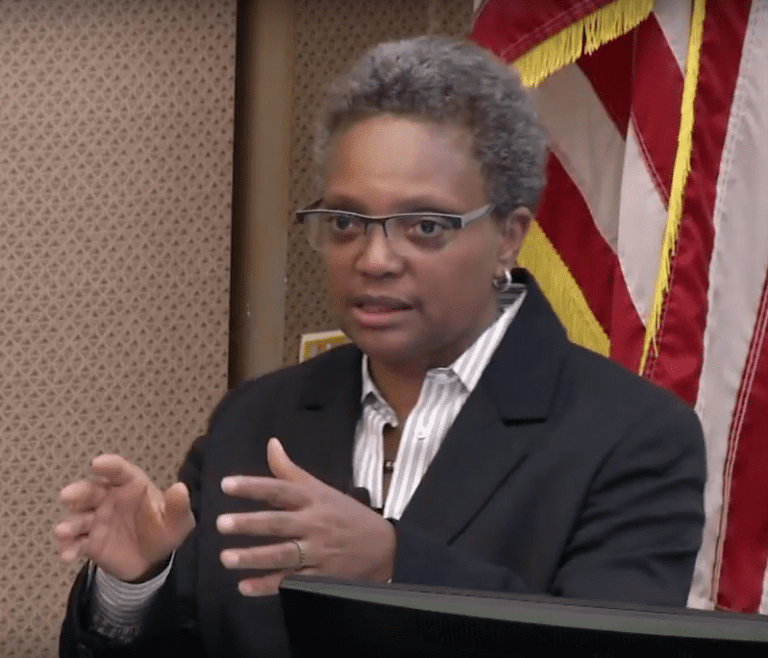
Is it an inaugural address if it’s given by a mayor rather than a president? Better safe than sorry, I guess.
At any rate, Chicago has a new mayor as of yesterday, and she gave a speech at her inauguration, and, for what it’s worth, she said some encouraging things with respect to city finances (including, yes, pensions):
My team has already been doing the necessary work of measuring the size and depth of our fiscal challenges, as well as working on a range of possible solutions. Once that analysis is complete, we will lay out a plan to put Chicago on the path to solvency.
No doubt some hard choices will have to be made and none of this is going to be easy. But we will do the hard work with transparency, integrity and a determination to put our pensions on a true path to solvency, and make our government work more efficiently, and without balancing budgets on the backs of low-wage and working-class Chicagoans. And we will get there … because we must.
Which is fine, I guess. I suppose it’s a good thing that she doesn’t say that “pensions are sacrosanct.” But Pritzker claimed to be making “hard choices” and calling for everyone to make “sacrifices” with respect to pensions, and his ultimate plan was a pension bond, the selling of unspecified state assets, and a reamortization, that is, a new “ramp” the particulars of which he never specified. So there is quite a bit of waiting yet to see what Lightfoot will actually propose, though her prior comments about the untouchability of pensions combined with her rather restrained promise not to balance the budget “on the backs of low-wage and working-class Chicagoans” — that is, lacking the usual promise not to raise taxes on the middle-class — suggests a path of (planned) administrative efficiency and tax hikes for everyone else.
Now, if we’re lucky, there will be some money to be found as a result of her corruption-fighting, and she’s hit the ground running with a ban on aldermanic privilege (that is, the ability of aldermen to control zoning decisions in their ward, generally acknowledged to be a means by which they have enriched themselves by means of bribe-equivalent campaign donations from developers) and shake-ups of city council, the finance committee, etc. How much money city government loses due to corruption, and how this effects the city’s economic development, I don’t know.
But here are some thoughts on the rest of her speech:
She begins with the usual sort of thanks to politicians and family and generic statements of hope that the city will become a place with lower crime and better education and more prosperity for all. She references (sorry, I think this is a bit tacky) being the first black female mayor and first openly-gay mayor in the city. She uses the four stars on Chicago’s flag, which stand for four moments in Chicago’s history (the establishment of Fort Dearborn, the Great Chicago Fire-rebuilding, and the World’s Fairs of 1893 and 1933) and “reinterpret(s) these four stars new meaning for a new century”. (Yeah, this rankles me, both because she had to shoehorn things a bit to get them to fit, as you’ll see, and because I don’t like to see upending of history. Yeah, I know this is a nit-pick.)
Her first star is safety, that is, a reduction in crime. She doesn’t really have a specific plan except a plan to bring in experts to make a plan. And maybe that’s as good as you can do, and there’s not really a pat answer, and maybe she used some buzzwords that communicated more specifics than I picked up on. (She did say she wanted to provide “a transition for our returning citizens,” which is the new euphemism for ex-cons, and that she wanted to repair “our broken mental health safety net” which I understand to reference re-opening city-funded mental clinics that had been closed for lack of money. But how much of her plan is one of money-spending, whether directly by the city or via grants to community groups, vs. somehow providing expert advice to those community groups trying to do this work on their own, I can’t tell.
Her second star is education. And, yes, promises about education inevitably end up being about how much money the city/school district has to spend. She steers clear of specific Chicago issues such as the opening of charter schools and the closing of public schools when these lose students due to shifts to charter schools (or population loss). She does say that “[e]very student should have the option to pursue vocational and technical training” with apprenticeships rather than pushing four-year college for all.
Her fourth star is integrity, that is her pledge for reform and I truly hope she succeeds here.
And her third star is stability, which is the hodge-podge star, since she throws all manner of things together: neighborhood economic development, affordable housing (including mandates that developers provide this rather than paying fees-in-lieu), and the city’s fiscal problems.
And that’s where she should have stopped, or maybe had a few more bland words and happy talk.
Instead, she says,
As I stand here today, Georgia is also on my mind, as is Alabama and every other state that is enacting laws intended to deprive women of our rights. Me must stand with women all across our country who fear for their basic rights and feel powerless in the face of the hateful legislation designed to control our bodies, our choices. We cannot go back — not in Chicago, not as a nation. We will join together and we will fight.
Really? Look, I’ve said already that I am not jumping into the debate on whether the Alabama and Georgia laws are the right thing, strategically; I worry that these bills will lose the support of those otherwise inclined to oppose abortion at least in the mushy-middle but writers who I’ve generally come to believe are intelligent and careful thinkers think otherwise, so I don’t have confidence either way. But does this really belong in such an-otherwise kumbaya speech, to use such antagonistic language for people who simply believe that human beings deserve protection from deliberate killing before they are born? I am so, so tired of abortion-rights folk unwilling to even grant that abortion opponents do not hate women, don not want to take away “basic rights” because they are unwilling to even recognize the basic premise being opposition to abortion. And for Lightfoot to have done this in her first official speech leaves a sour taste in my mouth — especially since she needs to set a tone in terms of whether she wants to work together with everyone who’s willing to join in her efforts, or whether she wants to go to battle with everyone she perceives of as her enemy.
And how will she “fight”? Does she plan on boycotts or using city resources or her own political capital or her personal “off-duty” time to fight for abortion access in other states?
And, finally, she calls everyone to follow the Golden Rule and says that this will be a guiding principle:
We will establish a new social compact here in Chicago based on a simple principle shared by every major religion in the world.
It goes by many names.
In Buddhism it says, “Hurt not others in ways that you yourself would find hurtful.”
In the Quran, it says, “Whoever saves a life, it is as though he had saved all mankind.”
It is in the Torah … and again in the New Testament, it is called the Great Commandment: “Love thy neighbor as thyself.”
No, no, and no. In the first place, there is a clear contrast between a Buddhist or neo-pagan formulation (in the latter case, “Do what you will, so long as it harms none“), which is a guideline for not doing harm to others, and the Jewish/Christian formulation which includes a positive call to actively do good to others.
And in the second place, the Quran only includes this Golden Rule-ish statement because it originally came from the Jews. Here’s the source (courtesy the columnist with the pen name Philologos writing at Mosaic Magazine):
In the 32nd verse of the fifth Sura, or chapter, of the Quran is a retelling of the biblical story of Cain and Abel. In it we read:
For this reason we have ordained for the Children of Israel that whoever kills a person, unless it be for manslaughter or for mischief in the land, it as though he had killed all men. And whoever saves a life, it is as though he had saved the lives of all men. And certainly our messengers came to them with clear arguments, but even after that many of them commit excesses in the land.
The author explains that this actually appears in the Quran not as a general principle to be followed but as an example of the Jews’ failings, that they were told by prophets to behave but didn’t.
Much of Sura 5 consists of an attack on Jews and Christians for thinking that they alone possess divine truth and are the sole objects of God’s concern.
And, in fact, the “whoever saves a life . . . ” formulation has its origin in the Talmud, which was completed before the Quran. (And, no, it is clear from this context that this was not a matter of the saying having been in general circulation at the time, either.)
Oh, and, incidentally, the Wikipedia compilation of Golden Rules doesn’t even include this verse.
So, look, I guess it’s nice that Lightfoot wanted to include references to religion. But I can’t imagine that Jews are particularly happy about Islam being credited with this maxim, even though I would likewise guess they won’t make a stink about it.
Image: https://commons.wikimedia.org/wiki/File:Lori_Lightfoot_at_MacLean_Center_(03).png; MacLean Center [CC BY 3.0 (https://creativecommons.org/licenses/by/3.0)]










